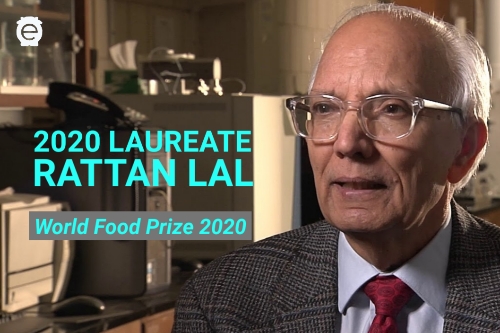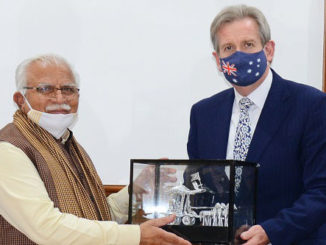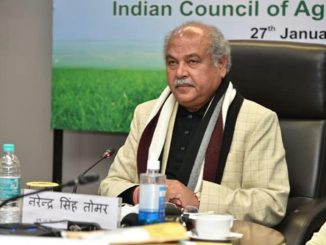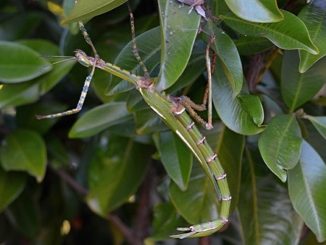Leading soil scientist Dr. Rattan Lal was announced today as the 2020 World Food Prize Laureate for developing and mainstreaming a soil-centric approach to increasing food production that conserves natural resources and mitigates climate change.
The 2020 Laureate Announcement Ceremony featured pre-recorded remarks from the U.S. Secretary of State Michael R. Pompeo and U.S. Secretary of Agriculture Sonny Perdue with World Food Prize Foundation President Barbara Stinson announcing the name of the Laureate.

“The world’s population continues to grow, and we need to use the resources we have more productively and efficiently to make sure everyone has enough food on their table,” said Secretary Pompeo. “Dr. Lal’s research in soil science shows that the solution to this problem is right under our feet. He’s helping the earth’s estimated 500 million small farmers be faithful stewards of their land though improved management, less soil degradation, and the recycling of nutrients. The billions of people who depend on these farms stand to benefit greatly from his work.”
From his humble beginnings as a refugee growing up on a small subsistence farm in India, Lal’s determination to learn and succeed in school propelled him to become one of the world’s foremost soil scientists. His pioneering research on the restoration of soil health in Africa, Asia and Latin America led to revelations that impacted agricultural yields, natural resource conservation and climate change mitigation. The agricultural practices Lal advocated are now at the heart of efforts to improve agriculture systems in the tropics and globally.
“The unbound joy and excitement of receiving the 2020 World Food Prize reminds me about the gratitude, privilege and honor of working for farmers from around the world,” said Dr. Lal, who now serves as Distinguished University Professor of Soil Science and founding Director of the Carbon Management and Sequestration Center at The Ohio State University (OSU). “Yet, the urgent task of feeding humanity is not fulfilled until each and every person has access to an adequate amount of nutritious food grown on a healthy soil and in a clean environment.”
Always working on the premise that the health of soil, plants, animals, people and the environment is indivisible, Dr. Lal began his research career at the International Institute of Tropical Agriculture in Nigeria, developing soil health restoration projects across Asia, Africa and Latin America. He explored and transformed techniques such as no-tillage, cover cropping, mulching and agroforestry that protected the soil from the elements, conserved water and returned nutrients, carbon and organic matter to the soil. This in turn improved the long-term sustainability of agroecosystems and minimized the risks to farmers of droughts, floods, and other effects of a changing climate.
In 1987, he returned to his alma mater, OSU, where his research showed how atmospheric carbon can be sequestered in soils. This breakthrough research transformed the way the world saw soils. As a result, soils are now not only the foundation for increasing the quality and quantity of food and preserving natural ecosystems, but an important part of mitigating climate change, as well. Three separate United Nations Climate Change Conferences adopted his strategy of restoring soil health as a means to sequestering carbon. In 2007, he was among those recognized with a Nobel Peace Prize Certificate for his contributions to the Intergovernmental Panel on Climate Change (IPCC) reports, when the IPCC was named co-recipient of the Nobel Prize.
“Dr. Lal is a trailblazer in soil science with a prodigious passion for research that improves soil health, enhances agricultural production, improves the nutritional quality of food, restores the environment and mitigates climate change,” said Stinson. “His decades of work to address all of these elements fully warrants his recognition as the 50th World Food Prize Laureate.”
Dr. Lal’s innovative research demonstrated how healthy soils are a crucial component of sustainable agricultural intensification – enabling higher crop yields, while requiring less land, agrochemicals, tillage, water and energy. His work has been pivotal in enhancing the productivity and sustainability of global agricultural systems, resulting in improved crop yields and food security, while also saving hundreds of millions of hectares of natural tropical ecosystems.
“Here at USDA our motto is ‘to do right and feed everyone,’” said Secretary Perdue. “The scientific innovations, like those developed by Dr. Lal, embody this motto in the work that he and we are doing. The agricultural practices Lal developed and advocated for are now at the heart of efforts to improve agricultural systems.”
Commenting on Dr. Lal’s selection, World Food Prize Selection Committee Chair and 2009 Laureate Dr. Gebisa Ejeta said, “Every year we are astounded by the quality of nominations for the Prize, but Dr. Lal’s stellar work on management and conservation of agriculture’s most cherished natural resource, the soil, set him apart. The impact of his research and advocacy on sustainability of agriculture and the environment cannot be overstressed. He is a most deserving recipient and inspiring leader.”
While Lal is one of the most prolific agricultural scientists with more than 100,000 citations, he is acutely aware of the necessity of working with national, international and governmental institutions to translate research into impact at the community and farmer level.
Lal’s models indicate that restoring soil health can lead to multiple benefits by the year 2100, including more than doubling the global annual grain yield to feed the growing world population, while decreasing the land area under grain cultivation by 30 percent and decreasing total fertilizer use by half. Making this a reality will enormously benefit farmers, food consumers and the environment.
“Achieving hunger-free humanity, soil degradation neutrality, negative emission farming and pollutant-free water are among principal challenges which can never be ignored,” said Dr. Lal.” Sustainable management of soil and agriculture is also essential to keeping global temperatures within the safe range and restoring the environment.”






Be the first to comment